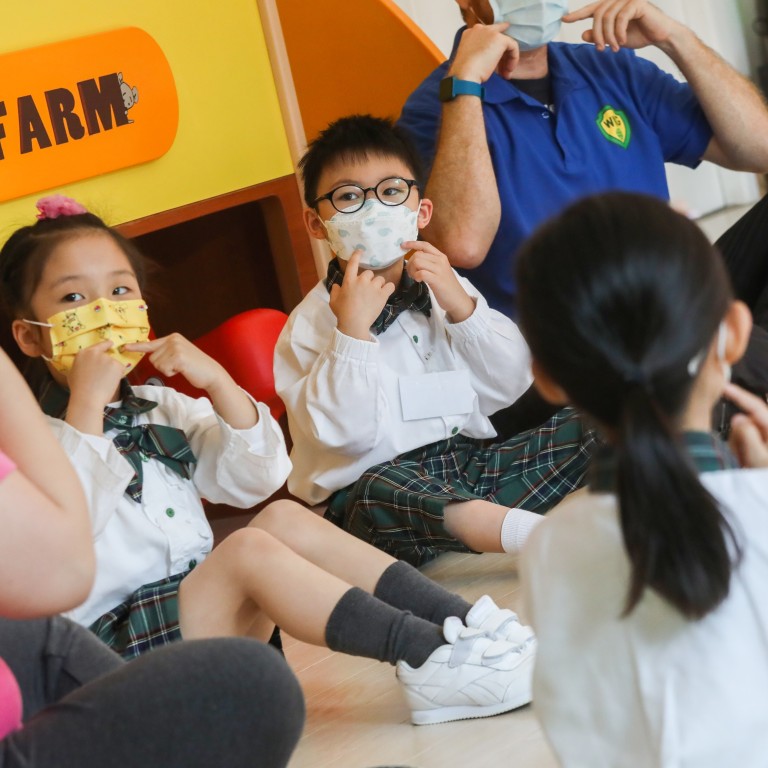
One-sixth of Hong Kong preschoolers need corrective glasses, study finds
- Hong Kong Children Vision Screening and Education Centre says it plans to conduct eye exams for city’s 170,000 preschoolers over the next 18 months
- Early childhood presents a ‘golden opportunity’ for intervention if vision impairments are detected soon enough, organisation says
One-sixth of preschool children in Hong Kong need corrective eyeglasses, according to a recent study by a local non-profit organisation, though most of their parents do not know it.
Warning of the potential for lasting harm if eyesight issues were not addressed early on, the Hong Kong Children Vision Screening and Education Centre (VSEC) on Tuesday said it would be testing the vision of all 170,000 local preschoolers for free over the next 18 months, and called on the government to help it continue to do so in the future.
“Up to 80 per cent of children’s perception of the outside world is through the eyes,” VSEC co-founder Kathy Siu said in a press conference. “If there are problems with their eyes, it will suppress their learning interest, and further hinder their physical and mental development and social ability.”
Hong Kong children’s well-being hit hard by school closures, survey finds
Over the past academic year, the organisation collaborated with kindergartens across the city to conduct eyesight exams for 4,832 children aged two to six, 779 of whom were found to have at least one type of vision impairment and needed to wear glasses.
Astigmatism was far and away the most prevalent condition, detected in 12.9 per cent of all participants. Myopia, or nearsightedness, and anisometropia – a condition in which the eyes have differing refractive powers – each accounted for around 2 per cent of participants. Squinting and hyperopia, or farsightedness, also accounted for around 1 per cent each.
Citing previous research by Chinese University, VSEC said Hong Kong’s rate of childhood myopia was one of the highest in the world.
Siu said the “vast majority” of the parents of participating children only found out about their vision problems as a result of the study.
Most parents living in subdivided flats say children study in poorly lit areas: survey
“And many of them used to think vision problems only occurred [later] during primary school, so they miss the golden opportunity for early intervention,” Siu said.
The Hong Kong government currently provides free vision tests for children aged four and above at its maternal and child health centres across the city.
But Paco Chan, a registered optometrist, said the exams should be conducted earlier to enable more timely intervention.
“The earlier children’s vision problems are detected, the more likely they are to be cured,” Chan said. “It would be a bit late to start treatment after six years old.”
In the United States, similar eye screening services are offered to infants as young as six months under a free public health programme called InfantSEE managed by the American Optometric Association’s charitable foundation.
Samantha Cheung, another VSEC co-founder, said vision exams for very young children were far more challenging as they were generally less cooperative than patients old enough to walk and talk.
Class disruptions take a toll on Hong Kong students’ academic performance
As a result, the VSEC offers in-school tests with a so-called spot vision screener – a handheld portable device that can assess a person’s eyesight from a metre away. Children only need to look at the screener for three to five seconds to get a reading, and the accuracy rate can be as high as 80 per cent.
“We usually do the screening in children’s playrooms, so that they are more cooperative in the familiar environment,” Cheung said. “It’s like taking a photo of them.”
If any problem is detected in the screening, the parents are recommended to seek a more thorough check for their children with an ophthalmologist.
“In the first stage of our programme, we aim to screen all the 170,000 preschool children within 18 months,” Cheung said. “In the second stage, we need more support from the government and other entities so that we can further help the children from low-income families and provide free glasses to them.”

